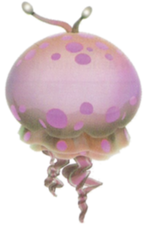Jellyfloat family: Difference between revisions
mNo edit summary |
(Naming section.) |
||
| Line 1: | Line 1: | ||
{{game icons|p2=y}} | {{game icons|p2=y}} | ||
The '''jellyfloat family''' is consisted of enemies that are jiggly, flying creatures resembling jellyfish, and are only found in certain underground [[cave]]s in ''[[Pikmin 2]]''. They are known for sucking [[Pikmin family|Pikmin]] into their gelatinous bells and digesting them over considerably long periods of time. Fortunately, they are extremely rare and easy to defeat with a decently-sized army of Pikmin | The '''jellyfloat family''' is consisted of enemies that are jiggly, flying creatures resembling jellyfish, and are only found in certain underground [[cave]]s in ''[[Pikmin 2]]''. They are known for sucking [[Pikmin family|Pikmin]] into their gelatinous bells and digesting them over considerably long periods of time. Fortunately, they are extremely rare and easy to defeat with a decently-sized army of Pikmin. | ||
Although unconfirmed, the [[Medusal Slurker]] in ''[[Pikmin 3]]'' could be a member of this family, given its similarities to the known jellyfloats. | Although unconfirmed, the [[Medusal Slurker]] in ''[[Pikmin 3]]'' could be a member of this family, given its similarities to the known jellyfloats. | ||
| Line 18: | Line 18: | ||
{{clear}} | {{clear}} | ||
== Naming == | |||
{{needs translation}} | |||
This family's name, and the name of the creatures in it, is a portmanteau of "{{w|jellyfish}}" and "float". The term "Spotted" in the members's names refers to the spots on their body. Their Japanese names use the word {{j|マンマン|Manman}}, which has no known meaning. The genus name used in their scientific names is ''Cephalus'', which can be assumed to be related to the real-world {{w|Cephalopod|Cephalopoda}} class of animals, or the word "head". Finally, their internal names use the term <code>kurage</code>, which simply means {{j|くらげ|kurage|jellyfish|f=tp}}. | |||
== See also == | == See also == | ||
Revision as of 10:04, February 10, 2017
The jellyfloat family is consisted of enemies that are jiggly, flying creatures resembling jellyfish, and are only found in certain underground caves in Pikmin 2. They are known for sucking Pikmin into their gelatinous bells and digesting them over considerably long periods of time. Fortunately, they are extremely rare and easy to defeat with a decently-sized army of Pikmin.
Although unconfirmed, the Medusal Slurker in Pikmin 3 could be a member of this family, given its similarities to the known jellyfloats.
Members
Greater Spotted Jellyfloat
- Main article: Greater Spotted Jellyfloat.
The Greater Spotted Jellyfloat is an enemy in Pikmin 2. As their name implies, they resemble larger, purple versions of the Lesser Spotted Jellyfloat. They have slightly more health and can be defeated in the same manner, but can suck up more Pikmin at once, and even your leader(s) if you're not careful. Likewise, all undigested Pikmin and leaders are returned when it is defeated. Ingested Pikmin will survive a long time before being digested. This species is also rarer than the other Jellyfloat.
Lesser Spotted Jellyfloat
- Main article: Lesser Spotted Jellyfloat.
The Lesser Spotted Jellyfloat is an enemy in Pikmin 2. They resemble large, blue, floating jellyfish with yellow spots that float through the air. They attack the Pikmin by inhaling them and trapping them inside. The Pikmin will then be digested one by one over considerably long periods of time. Purple Pikmin will automatically make this creature fall due to their weight. They are also good for defeating it, as stunning it will prevent it from getting back into air. When defeated, all undigested Pikmin will be recovered.
Naming
|
The following article or section needs help from someone who can translate Japanese text. |
This family's name, and the name of the creatures in it, is a portmanteau of "jellyfish" and "float". The term "Spotted" in the members's names refers to the spots on their body. Their Japanese names use the word マンマン?, which has no known meaning. The genus name used in their scientific names is Cephalus, which can be assumed to be related to the real-world Cephalopoda class of animals, or the word "head". Finally, their internal names use the term kurage, which simply means くらげ? (lit.: "jellyfish").
